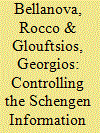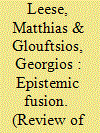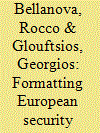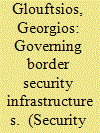|
|
|
Sort Order |
|
|
|
Items / Page
|
|
|
|
|
|
|
| Srl | Item |
| 1 |
ID:
184316


|
|
|
|
|
| Summary/Abstract |
This article focuses on the Schengen Information System (SIS II) – the largest data infrastructure supporting police cooperation and border controls in the European Union. Through the SIS II, national authorities exchange information about individuals and objects, and this across national and institutional boundaries. Yet, the SIS II does not always perform as anticipated in its design scripts. Following common threads about infrastructural politics across Science and Technology Studies, political geography and critical security studies, we explore fragility and maintenance as being intrinsic to the functioning of data infrastructures and crucial sites of governance. We show how the SIS II is kept under continuous control to operate as a controlling data infrastructure. This article contributes to a critical inquiry into the datafication of border controls by interrogating how data acquire the status of allegedly credible and accurate information. Ultimately, this approach pinpoints the inherent fragility of seemingly mighty data infrastructures and casts a light on those actors and processes that sustain, through maintenance, contemporary digital borders.
|
|
|
|
|
|
|
|
|
|
|
|
|
|
|
|
| 2 |
ID:
193301


|
|
|
|
|
| Summary/Abstract |
This article focuses on the control of international mobility through the gathering, processing, and sharing of air travellers’ data. While a lot has been written about pre-emptive rationalities of security translated into the functionalities of IT systems used for border controls, we take a step further and investigate how these rationalities are operationalised through data transfer, screening, validation, discarding, profiling, contextualisation, calibration, and adjustment practices. These practices may seem banal and technical; however, we demonstrate how they matter politically as they underpin the making of international security. We do so by analysing the work of Passenger Information Units (PIUs) and retracing how they turn Passenger Name Record (PNR) data into actionable intelligence for counterterrorism and the fight against serious crime. To better understand the work of PIUs, we introduce and unpack the concept of ‘epistemic fusion’. This explicates how security intelligence comes into being through practices that pertain to cross-domain data frictions, the contextualisation of data-driven knowledge through its synthesis with more traditional forms of investigatory knowledge and expertise, and the adjustment of the intelligence produced to make it actionable on the ground.
|
|
|
|
|
|
|
|
|
|
|
|
|
|
|
|
| 3 |
ID:
187082


|
|
|
|
|
| Summary/Abstract |
In this article, we explore the security politics of EU database interoperability, inquiring how knowledge infrastructures underpin European security integration. Sitting at the intersection of Science and Technology Studies (STS) and critical approaches to European security, we unpack the co-constitutive relation between database anxieties and interoperability mechanisms. By database anxieties, we refer to what European institutions identify as the main epistemic and operational concerns that emerge from the current use of databases by security authorities across Europe. These anxieties are expected to be resolved by mechanisms that foster interoperability. We argue that the relation between database anxieties and interoperability mechanisms shapes the novel conditions of possibility for European security integration in a datafied world. While far-reaching in technological terms, interoperability is not about introducing a new overarching system, but about the management, re-organisation and re-purposing of datasets. Such formatting matters politically because it eventually informs sovereign acts of policing and mobility control.
|
|
|
|
|
|
|
|
|
|
|
|
|
|
|
|
| 4 |
ID:
182654


|
|
|
|
|
| Summary/Abstract |
This article explores the maintenance of large-scale information systems that are used for, among other purposes, border security in the European Union. My argument is that information systems do not always operate according to their design scripts. They materialize as unruly, unstable and failing infrastructures that are governed through maintenance in order to correct any identified functional anomalies and address potential future failures by adapting them to emerging technologies and the service needs of end-users (e.g. border guards, police). To conceptualize the maintenance labour through which information systems are governed, I synthesize ideas developed in Michel Foucault’s work on biopolitics and governmentality with contributions that explore the agentic forces and proclivities of technoscientific matter. By unearthing the very mechanics of maintenance processes, I make two contributions to the literature that interrogates the digitization and smartening of border security. First, I demonstrate that attending to maintenance permits a more complete understanding of the agency of information systems. Second, I broaden the research agenda that explores border security as practice by directing attention towards the often invisible, but politically significant, labour of maintainers who, by rendering information systems functional, sustain the power to govern international mobility by digital means.
|
|
|
|
|
|
|
|
|
|
|
|
|
|
|
|
|
|
|
|
|